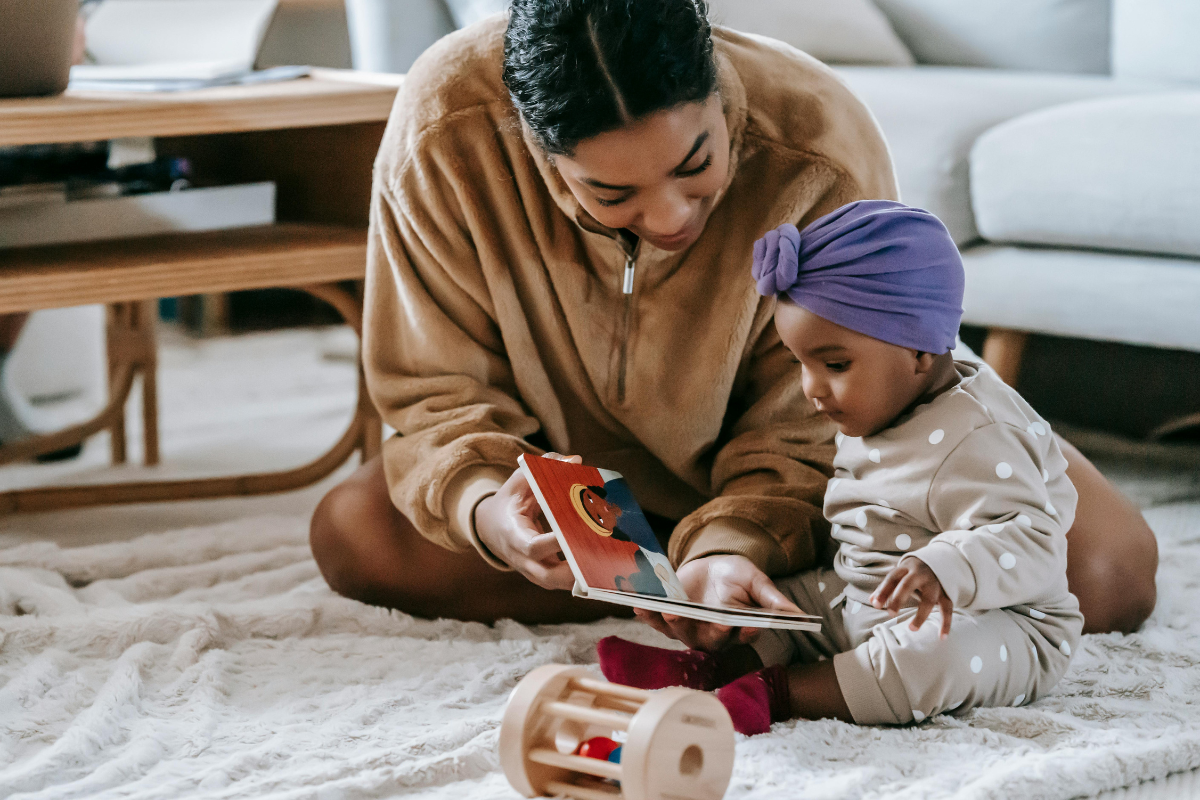Early Reading Explorations: Colorful Stories for Curious Minds

Reading to babies from a young age provides numerous developmental benefits that can have lasting impacts. Though newborns cannot yet turn pages or understand stories, exposing them to books lays the critical groundwork for language acquisition and other critical skills.
Regularly reading to infants introduces them to vocabulary, speech patterns, and the cadence of language itself. A 2019 study found that babies read to daily hear a staggering 78,000 words per year on average. This immense word exposure from birth to age 5 equates to 1.4 million words - providing children a substantial head start in developing strong language abilities linked to future academic success.
Beyond building linguistic skills, reading nurtures critical cognitive and social-emotional development. The rhythmic intonation of stories can soothe babies, while the interaction helps strengthen parent-child bonding. And the vivid imagery of books stimulates young minds beginning to make sense of the world around them.
Though it may seem one-sided at first, reading prints the importance of literacy into newborns' first experiences. With dedication from parents and caregivers, these earliest reading sessions plant the seeds for countless developmental benefits blooming in the years ahead.
Cognitive development from reading

One of the most valuable gifts parents can bestow upon their children is an early love of reading and books. While babies cannot yet comprehend stories, sharing those first books sparks critical development across multiple areas. Beyond purely cognitive gains, reading aloud instills a passion for literature and learning that can enrich lives immeasurably.
At the most fundamental level, reading exposes babies to the rich tapestry of language. Every story is a masterclass in speech sounds, word forms, rhythms, and intonation patterns. This sustained auditory experience quite literally hard-wires neural pathways for speech and language acquisition. Varied sentence structures and an ever-expanding vocabulary prepare babies' brains for their own upcoming verbal milestones.
Yet reading nurtures much more than just language skills. The imagery of picture books provides babies with early insights into the vast world around them. The illustrated scenes beckon their blossoming imaginations while introducing new concepts, objects, and ideas. Fantastical stories can spark creativity and curiosity even before babies can turn the pages themselves.
Perhaps most importantly, sharing books cultivates priceless bonding moments central to social-emotional development. The intimacy of cuddling together over a book, exchanging vocalizations, and connecting over the vibrant pictures affirms babies' secure attachments. These cozy read-aloud sessions create cherished family memories while associating books with feelings of love and comfort.
Though infant reading may seem one-sided at first glance, these shared experiences provide babies with enduring gifts. In nurturing minds and hearts from the start, parents foster abilities - and appetite - for lifelong learning.
What responses can you expect from reading to babies?
As infants progress through their first year, the way they interact with and experience books evolves in fascinating ways:
In the newborn phase of 0-3 months, reading aloud is primarily a visually and auditorily stimulating experience. Babies will gaze intently at the colorful pictures while taking in the sounds, rhythms, and inflections of your voice. Their tolerance for books may be brief at first, but these earliest exposures begin laying neural foundations.
Around 6 months, babies become more physically engaged with books as developing motor skills allow them to reach, grab, pat, and mouth the texts. They'll issue excited coos, babbles, and smiles in response to the interactive reading experience. Simple board books are perfect for safe exploration.
By 9 months, babies display more obvious comprehension by babbling at pictures and attempting to lift flaps or manipulate movable parts. The magic of object permanence allows them to understand a book's existence even when temporarily out of sight. Babies assert more independence in grasping books themselves and"reading" by deliberately turning pages.
Once they celebrate their first birthdays, toddlers can fully immerse themselves in stories. They'll point to illustrations they recognize, make animal sounds matching the characters, and even carry books around to"read" independently. Demanding favorite titles be read repeatedly is a typical behavior demonstrating their blossoming book love.
The rapid developmental progression from passive observer to eager participant showcases how crucial these early reading experiences are. Each new stage allows babies to build comprehension, cognitive skills, and cherished connections through the wonderment of books.
How often should you read a book to your baby?
For new parents facing the whirlwind of caring for a newborn, the thought of adding reading time can seem daunting amidst feedings and sleep deprivation. However, it's wise to reframe the experience - reading with your baby provides a cherished opportunity to pause, recharge, and nurture a special bond through cuddling and closeness. Rather than viewing it as another obligation, embrace reading as a chance to slow down and savor meaningful moments together.
While longer sessions may not be realistic at first, even short 5-10 minute reading periods can be impactful, as long as your newborn remains engaged. An early childhood expert advises that reading aloud effectively "deposits" language-building words into your baby's blossoming brain - so the earlier and more frequently you read, the richer their future comprehension will be upon entering school.
To help build a consistent habit, designate a daily "reading routine" during naturally calm times like after baths or before bedtime. Keeping beloved books easily accessible in your typical snuggle spots serves as a helpful reminder. For overwhelmed parents, this ritual creates a predictable anchor in the day for connection.
When reading, parents should aim to create an immersive, distraction-free experience. Cuddling skin-to-skin cultivates security while using expressive voices for characters ignites imagination. Pausing to point out pictures or make observations keeps your baby actively engaged. Minimize disruptions by silencing devices and turning off screens.
As babies mature, encourage them to interact more directly - allowing them to touch pages, lift flaps, and eventually even turn pages themselves. Don't worry about re-reading favorite titles repeatedly - babies delight in the familiarity! Pay attention to the books capturing their interests most.
The most meaningful gift new parents can provide is fostering a deep, abiding love of books and reading from the very start. With patience and consistency, even brief daily reading sessions plant seeds for flourishing language skills, bonding memories, and lifelong literary appreciation to blossom.
How do you pick the books to read?
When selecting books to share with your baby, look for simple stories with repetitive text and bold, colorful illustrations. Even just paging through photo albums of family can serve as an engaging "book" at this age. The most important factors are exposing your infant to rich language and nurturing an early love of books.
Parents should feel free to choose books that hold special meaning or nostalgic charm from their own childhoods. Rediscovering beloved classics while introducing them to the next generation can make reading time even more magical. Additionally, take full advantage of your local library's resources - this allows you to continually rotate new books into the mix for free, maintaining variety and novelty.
In the earliest months, babies tend to be most captivated by very simple picture books featuring high-contrast black and white patterns or vivid colors splashed across the pages. They also delight in exploring different textures like crinkly fabrics interspersed throughout cloth and sturdy board books. Engaging multiple senses immerses babies more fully.
As they approach the toddler stage, seek out interactive books with flaps to lift or interactive elements that encourage participation. Tried-and-true titles like Goodnight Moon and the works of beloved children's authors like Sandra Boynton tend to enchant this age with their rhythmic, whimsical language.
However, try not to stress over choosing the "perfect" books. The most essential thing is establishing a consistent reading routine and allowing your child to foster positive associations with books from the start. Even reciting nursery rhymes, singing songs, or reading aloud from adult novels can benefit their cognitive development.
With the rapid pace of growth, take care to provide age-appropriate reading material as your child matures. Board books and cloth books with thicker pages are ideal for rambunctious little hands. Surrounding children with print-rich environments containing ample reading resources promotes their language and literacy skills.
The books themselves are less important than cultivating reading as a cherished ritual of bonding, learning, and imaginative exploration together. With time, patience, and immersion in the wonder of stories, you'll instill a love of reading that lasts a lifetime.
Reading to babies from an early age provides unparalleled developmental benefits. Through engaging story times, parents nurture foundational language skills, literacy abilities, and cognitive growth. But the impacts stretch far beyond academics.
The reading routine itself forges powerful connections - a calming ritual amid the exhaustion of new parenthood that strengthens the sacred parent-child bond. Babies delight in the multi-sensory experience of voices, pictures, and cuddling while their imagination blooms.
Most importantly, shared reading memories instill an abiding love of literature's magic. With every tale, parents plant seeds for a lifelong passion for books and all the enriching advantages that bloom from it.
Though it requires persistence, childhood reading lays the sturdiest foundation for future learning. These irreplaceable together-times create formative cognitive and emotional experiences transcending generations. Within the rhymes and rhythms, parents craft their child's first indelible chapters toward brilliant stories ahead.
